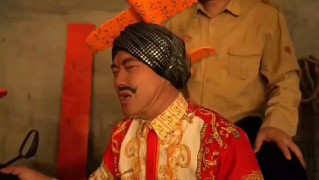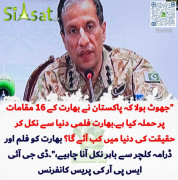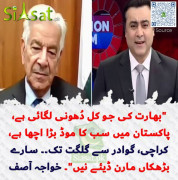You are using an out of date browser. It may not display this or other websites correctly.
You should upgrade or use an alternative browser.
You should upgrade or use an alternative browser.
Saudi King Backs Hosni Mubarak !!!
- Thread starter canadian
- Start date
canadian
Chief Minister (5k+ posts)
They are all corrupt!! Every last one of them!
Yeh Zardari Sey Bhi Doo Hath Aagey Hai !!
canadian
Chief Minister (5k+ posts)
A primer on the Egyptian crisis
Published On Fri Jan 28 2011

 By Olivia Ward Foreign Affairs Reporter
By Olivia Ward Foreign Affairs Reporter
The message from the Egyptian streets was loud and clear: “Mubarak, your plane is waiting.”
But whether Egypt’s suave strongman, Hosni Mubarak, gets the same one-way ticket handed to Tunisia’s dictatorial President Zine el-Abidine Ben Ali is still up in the air, as thousands of demonstrators throng the streets of Cairo and even smaller cities are clouded with tear gas.
Some questions:
Q: Why now?
A: Egyptians have lived under 82-year-old Mubarak’s rule for 30 years. But in spite of his moderate international tone, he has been a domestic dictator, suppressing political parties, banning the main Islamic opposition group, and using police state tactics against suspected foes, including the media. Meanwhile poverty and corruption flourished.
Sporadic protests rose for years, and were brutally put down. But the Tunisian uprising inspired a new social media call-out, and an explosion of activism from people who had lost hope of change. They also wanted to head off skewed elections that would keep Mubarak’s supporters in power longer, and allow the presidency to be passed to his son.
Q: What are they asking for?
A: An end to police state rule and a three-decade emergency law that restricts political activity, including peaceful demonstrations. Democratic elections, a clean-up of cronyism and corruption, more jobs and better pay. The poor hope for breaks in the price of food.
Q: Who can give it to them?
A: Unclear. Mubarak’s main opposition is the Muslim Brotherhood, currently banned. Other parties have insignificant numbers in parliament. Mubarak’s highest profile rival is Nobel laureate Mohamed ElBaradei, who boosted his street cred by facing off against riot police, being soaked by water cannons and reportedly locked up under house arrest.
Q: Who are the protesters?
A: Originally young middle class social media buffs, their zeal spread to all ages and fanned out to poorer Egyptians. With unemployment officially 10 per cent and some analysts say closer to 20 per cent, many have time to join in.
Q: What’s the economy like?
A: The average wage is less than $200 a month, and prices are rising. The UN calls Egypt a “low income food-deficit country,” and one-fifth of its 85 million people live on less than $1 a day.
Q: And education?
A: One in four Egyptians is illiterate, with a higher rate among women.
Q: Does religion play a role?
A: Not directly. The largest organized opposition group Muslim Brotherhood has issued no rallying cry, but a number of members have been arrested and younger supporters joined some demonstrations. The Brotherhood’s participation could be a game changer for the outcome of the protests. So far it’s not about religion, and even extremist Salafis said they would stay away. Many Egyptians are moderate Sufis, and reject radicalism but identify with the protesters.
Q: What about the security forces?
A: Too volatile to tell. Egypt has the 10th largest army in the world, numbering nearly 1 million active servicemen and reservists, and equipped by billions of dollars from the U.S. It also has a 400,000-strong paramilitary force.
Both appeared loyal to Mubarak, but there were reports of some police joining protesters, and army units being cheered as protectors of the people. Riot police have attacked crowds, but sometimes held back. The outcome of the protests depends on Mubarak keeping both forces on side. Worst case scenario: clashes between army and police.
Q: So, will Mubarak board the plane?
A: Yes, if the protests continue to swell, the security forces break away, and he is willing to negotiate a peaceful turnover of power to an interim government with free elections to come, in exchange for an unhampered getaway.
No, if Mubarak is willing to use massive force, continues to block communications and keeps the security forces — and the U.S. — on side. But the latter could mean a deal to loosen his grip on power.
Q: Would Washington intervene?
A: Not overtly. Mubarak has been a reliable ally in the war on terror, and shares U.S. fears of Iran and Islamic extremism. Washington would also be wary of a resurgent Muslim Brotherhood. But if it feared serious instability under Mubarak it could use its strong financial leverage to pressure him into an “honorable retirement.” Then likely switch its support to ElBaradei, a former head of the UN’s atomic watchdog agency.
Q: Time to cancel my trip to the pyramids?
A: The Egyptian tourist industry hopes not. It pulls in more than 11 per cent of the GNP, and provides one in eight jobs. With close to $1 billion a month coming in from tourism, every week of unrest is a huge loss to the economy. Stay tuned. (http://www.thestar.com/news/world/article/930104--a-primer-on-the-egyptian-crisis)
Published On Fri Jan 28 2011

 By Olivia Ward Foreign Affairs Reporter
By Olivia Ward Foreign Affairs Reporter The message from the Egyptian streets was loud and clear: “Mubarak, your plane is waiting.”
But whether Egypt’s suave strongman, Hosni Mubarak, gets the same one-way ticket handed to Tunisia’s dictatorial President Zine el-Abidine Ben Ali is still up in the air, as thousands of demonstrators throng the streets of Cairo and even smaller cities are clouded with tear gas.
Some questions:
Q: Why now?
A: Egyptians have lived under 82-year-old Mubarak’s rule for 30 years. But in spite of his moderate international tone, he has been a domestic dictator, suppressing political parties, banning the main Islamic opposition group, and using police state tactics against suspected foes, including the media. Meanwhile poverty and corruption flourished.
Sporadic protests rose for years, and were brutally put down. But the Tunisian uprising inspired a new social media call-out, and an explosion of activism from people who had lost hope of change. They also wanted to head off skewed elections that would keep Mubarak’s supporters in power longer, and allow the presidency to be passed to his son.
Q: What are they asking for?
A: An end to police state rule and a three-decade emergency law that restricts political activity, including peaceful demonstrations. Democratic elections, a clean-up of cronyism and corruption, more jobs and better pay. The poor hope for breaks in the price of food.
Q: Who can give it to them?
A: Unclear. Mubarak’s main opposition is the Muslim Brotherhood, currently banned. Other parties have insignificant numbers in parliament. Mubarak’s highest profile rival is Nobel laureate Mohamed ElBaradei, who boosted his street cred by facing off against riot police, being soaked by water cannons and reportedly locked up under house arrest.
Q: Who are the protesters?
A: Originally young middle class social media buffs, their zeal spread to all ages and fanned out to poorer Egyptians. With unemployment officially 10 per cent and some analysts say closer to 20 per cent, many have time to join in.
Q: What’s the economy like?
A: The average wage is less than $200 a month, and prices are rising. The UN calls Egypt a “low income food-deficit country,” and one-fifth of its 85 million people live on less than $1 a day.
Q: And education?
A: One in four Egyptians is illiterate, with a higher rate among women.
Q: Does religion play a role?
A: Not directly. The largest organized opposition group Muslim Brotherhood has issued no rallying cry, but a number of members have been arrested and younger supporters joined some demonstrations. The Brotherhood’s participation could be a game changer for the outcome of the protests. So far it’s not about religion, and even extremist Salafis said they would stay away. Many Egyptians are moderate Sufis, and reject radicalism but identify with the protesters.
Q: What about the security forces?
A: Too volatile to tell. Egypt has the 10th largest army in the world, numbering nearly 1 million active servicemen and reservists, and equipped by billions of dollars from the U.S. It also has a 400,000-strong paramilitary force.
Both appeared loyal to Mubarak, but there were reports of some police joining protesters, and army units being cheered as protectors of the people. Riot police have attacked crowds, but sometimes held back. The outcome of the protests depends on Mubarak keeping both forces on side. Worst case scenario: clashes between army and police.
Q: So, will Mubarak board the plane?
A: Yes, if the protests continue to swell, the security forces break away, and he is willing to negotiate a peaceful turnover of power to an interim government with free elections to come, in exchange for an unhampered getaway.
No, if Mubarak is willing to use massive force, continues to block communications and keeps the security forces — and the U.S. — on side. But the latter could mean a deal to loosen his grip on power.
Q: Would Washington intervene?
A: Not overtly. Mubarak has been a reliable ally in the war on terror, and shares U.S. fears of Iran and Islamic extremism. Washington would also be wary of a resurgent Muslim Brotherhood. But if it feared serious instability under Mubarak it could use its strong financial leverage to pressure him into an “honorable retirement.” Then likely switch its support to ElBaradei, a former head of the UN’s atomic watchdog agency.
Q: Time to cancel my trip to the pyramids?
A: The Egyptian tourist industry hopes not. It pulls in more than 11 per cent of the GNP, and provides one in eight jobs. With close to $1 billion a month coming in from tourism, every week of unrest is a huge loss to the economy. Stay tuned. (http://www.thestar.com/news/world/article/930104--a-primer-on-the-egyptian-crisis)
canadian
Chief Minister (5k+ posts)
Saudi king expresses support for Egyptian president
By AFP
Published: January 29, 2011

King Abdullah bin Abdul Aziz. PHOTO: AFP
RIYADH: Saudi King Abdullah has expressed his support for embattled President Hosni Mubarak and slammed those “tampering” with Egypt’s security and stability, state news agency SPA reported on Saturday.
The Saudi ruler, in Morocco recovering from back surgery performed in the United States, telephoned Mubarak early Saturday, the report said.
During the conversation, Abdullah condemned “intruders” he said were “tampering with Egypt’s security and stability … in the name of freedom of expression.”
Saudi Arabia, he added, “stands with all its means with the government and people of Egypt.”
SPA said Mubarak had responded by assuring King Abdullah that “the situation is stable (in Egypt) … and what the world has seen is nothing more than an attempt by some … suspicious groups which do not want stability and security for Egyptians.”
“No Arab or Muslim can tolerate any meddling in the security and stability of Arab and Muslim Egypt by those who infiltrated the people in the name of freedom of expression, exploiting it to inject their destructive hatred,” SPA quoted King Abdullah as saying.
Thousands of anti-regime demonstrators poured onto Cairo’s streets again Saturday as massive protests against the rule of Mubarak raged into a fifth straight day.
The 82-year-old Egyptian leader in a television address early Saturday said he would replace his cabinet and vowed economic and political reforms in the world’s most populous Arab nation, but showed no sign of easing his decades-old grip on power.(http://tribune.com.pk/story/111006/saudi-king-expresses-support-for-egyptian-president/)
By AFP
Published: January 29, 2011

King Abdullah bin Abdul Aziz. PHOTO: AFP
RIYADH: Saudi King Abdullah has expressed his support for embattled President Hosni Mubarak and slammed those “tampering” with Egypt’s security and stability, state news agency SPA reported on Saturday.
The Saudi ruler, in Morocco recovering from back surgery performed in the United States, telephoned Mubarak early Saturday, the report said.
During the conversation, Abdullah condemned “intruders” he said were “tampering with Egypt’s security and stability … in the name of freedom of expression.”
Saudi Arabia, he added, “stands with all its means with the government and people of Egypt.”
SPA said Mubarak had responded by assuring King Abdullah that “the situation is stable (in Egypt) … and what the world has seen is nothing more than an attempt by some … suspicious groups which do not want stability and security for Egyptians.”
“No Arab or Muslim can tolerate any meddling in the security and stability of Arab and Muslim Egypt by those who infiltrated the people in the name of freedom of expression, exploiting it to inject their destructive hatred,” SPA quoted King Abdullah as saying.
Thousands of anti-regime demonstrators poured onto Cairo’s streets again Saturday as massive protests against the rule of Mubarak raged into a fifth straight day.
The 82-year-old Egyptian leader in a television address early Saturday said he would replace his cabinet and vowed economic and political reforms in the world’s most populous Arab nation, but showed no sign of easing his decades-old grip on power.(http://tribune.com.pk/story/111006/saudi-king-expresses-support-for-egyptian-president/)
Imranpak
Chief Minister (5k+ posts)
Saudi's know that they're next after Egypt and Tunisia so are supporting opression!. These bastards have been sitting on Muslim wealth like snakes for decades but there time will come soon, inshallah!. Such will be the demise of these traitors that history won't even remember their freakin' names...
-
-
-
-
نواز گونگا غائب
26 | FORUM
-
-
© Copyrights 2008 - 2025 Siasat.pk - All Rights Reserved. Privacy Policy | Disclaimer|






























